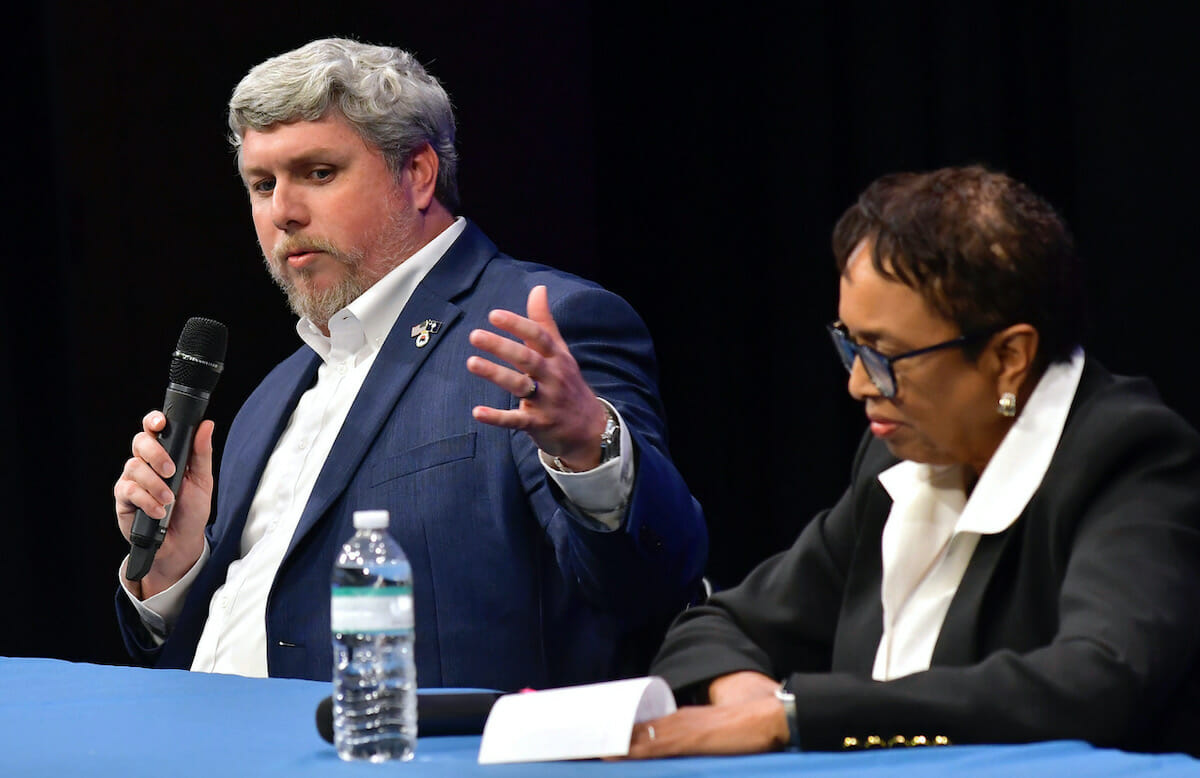CHAMPVA is a valuable benefit for eligible veterans and veteran family members (survivors and caregivers). Every veteran with disabilities, every surviving spouse of or child of a veteran with disabilities and every surviving spouse or child of a veteran who has died needs to know about CHAMPVA benefits and how to apply for those benefits.
If a veteran or survivor does not qualify for TRICARE (the Department of Defense’s health care program for active-duty and retired service members and their families), they may be able to get health insurance through CHAMPVA.
What is CHAMPVA?
The Civilian Health and Medical Program of the Department of Veterans Affairs (CHAMPVA) is a health benefits program in which the VA shares the cost of certain healthcare services and supplies with eligible beneficiaries. CHAMPVA is managed by the Veterans Health Administration Office of Community Care in Denver.
What does CHAMPVA pay?
For eligible beneficiaries, the VA’s CHAMPVA Program covers the cost of some veteran and survivor healthcare services and supplies. CHAMPVA is a cost-sharing program. Find out if you qualify and how to apply at https://bit.ly/3FCwL1E.
In most cases, CHAMPVA’s allowable amount (what the VA pays) is equivalent to MEDICARE/TRICARE rates. CHAMPVA has an outpatient deductible of $50 per beneficiary per calendar year or a maximum of $100 per family per calendar year and a patient cost share of 25% of the VA’s allowable catastrophic cap of $3,000 per year.
If a patient has other health insurance, then CHAMPVA pays the lessor of either 75% of the allowable amount after the $50 calendar deductible is satisfied, or the remainder of the charges, and the beneficiary will normally have no cost share. Read the VA’s Fact Sheet titled CHAMPVA DEDUCTIBLES AND COPAYS, at https://bit.ly/3UiiDyR.
CHAMPVA Eligibility Requirements
Veterans and survivors may only be eligible for healthcare through CHMAPVA if they do NOT qualify for TRICARE and at least one of the following is true for the veteran or survivor:
1. You are the spouse or child of a veteran who has been rated PERMANENTLY AND TOTALLY DISABLED for a service-connected disability by a Veterans Benefits Administration (VBA) regional office or …
2. You are the surviving spouse or child of a veteran who DIED FROM A VA-RATED SERVICE-CONNECTED DISABILITY or …
3. You are the surviving spouse or child of a veteran who was AT THE TIME OF DEATH RATED PERMANENTLY AND TOTALLY DISABLED for a military service-connected disability by a VBA regional office or …
4. You are the surviving spouse or child of a veteran who DIED IN THE LINE OF DUTY, not due to misconduct (in most of these cases, family members qualify for TRICARE, not CHAMPVA).
Definition of a service-connected disability
A service-connected disability is a disability that the VA concluded was caused or made worse by the veteran’s active-duty military service.
A qualifying CHAMPVA sponsor may also qualify for VA healthcare based on their own veteran status.
A veteran who is the qualifying CHAMPVA sponsor for their family may also qualify for VA healthcare based on their own veteran status. Also, if two spouses are both veterans who qualify as CHAMPVA sponsors for their family, they both may qualify for CHAMPVA benefits. Each time either spouse needs medical care, they may choose to get care through the VA healthcare program or their CHAMPVA coverage.
The following seven other factors might affect whether a veteran or family member can get CHAMPVA benefits.
- A new or expectant mother. If you are expecting a baby, you will need to take the two steps listed here before you can apply for CHAMPVA for your newborn.
STEP 1. You will need to get a Social Security number for your baby by applying at the nearest Social Security Administration office and
STEP 2. You will need to set up the baby’s status as a dependent of the veteran sponsor by contacting your nearest VBA regional office.
Medical claims can’t be paid until you sign your baby up under CHAMPVA, so get them a Social Security number and set their status as a dependent quickly. Find Social Security Offices at https://secure.ssa.gov/ICON/main.jsp. Find VBA Regional Offices at https://www.va.gov/find-locations/?facilityType=benefits.
- A surviving spouse who is currently remarried. If you are the surviving spouse of a qualifying CHAMPVA sponsor and you remarry before age 55, you NO LONGER QUALIFY for CHAMPVA as of midnight on the date of your remarriage. If you are the surviving spouse of a qualifying CHAMPVA sponsor and you remarry on or after your 55th birthday, you can keep your CHAMPVA benefits.
- A surviving spouse whose remarriage has ended by death, divorce, or annulment. If you are the surviving spouse of a qualifying CHAMPVA sponsor and you remarry, but the remarriage ends by death, divorce, or annulment, you may qualify again for CHAMPVA. The first date that you qualify again is the first day of the month after your remarriage ends or December 1, 1999, whichever date is later. You will need to provide the VA with copies of your marriage certificate and death, divorce, or annulment documents, whichever is appropriate).
- An 18 to 23-year-old dependent child of a veteran. If you are covered under CHAMPVA and you turn 18 years old, you will need to send the VBA proof that you are enrolled full-time in college or another educational institution to keep getting benefits. Dependent children need to read the instructions found on the SCHOOL ENROLLMENT CERTIFICATION REQUIREMENTS FOR CHAMPVA BENEFITS Fact Sheet at https://bit.ly/3SS4U0C.
- A veteran’s stepchild who leaves the veteran’s household. If you were covered under CHAMPVA as the stepchild of a veteran, and you leave the veteran’s household because of a divorce or remarriage, you no longer qualify for CHAMPVA.
- A primary family caregiver of a veteran with injuries and/or disabilities. If you are a family member caring for a veteran with disabilities, and you are not entitled to care or services through another health plan, you may qualify for CHAMPVA. Caregivers and veterans should read the INFORMATION FOR CAREGIVERS at https://bit.ly/3gVqcwW.
- A CHAMPVA beneficiary who is 65 years old or older or who qualifies for Medicare at any age. CHAMPVA is always the second payer to Medicare. If you are UNDER 65 years old, you are eligible for CHAMPVA if you meet BOTH of these requirements – 1. You have both Medicare Parts A and B, and 2. You are otherwise eligible for CHAMPVA. If you are 65 years old or older, you’re eligible for CHAMPVA if you are eligible for Medicare. If you turned 65 before June 5, 2001, and you are entitled to either Medicare Part A or B, you will also need to enroll in Medicare Part B to be eligible for CHAMPVA. You do not need to enroll in Medicare Part D to qualify for CHAMPVA. Veterans and beneficiaries need to carefully read the information in the MEDICARE AND CHAMPVA Fact Sheet found at https://bit.ly/3DO2SKn.
Larry Dandridge is a Vietnam War wounded warrior, disabled veteran, ex-Enlisted Infantryman, ex-Warrant Officer Pilot, and retired Lt. Colonel. He is a past Veterans Service Officer, a Patient Adviser at the RHJ VA Hospital, the Fisher House Charleston Good Will Ambassador, and the VP for Veteran Affairs for the local Army Association Chapter. Larry is the author of the award-winning book Blades of Thunder and a contributing free-lance writer with the Island News. Contact him at LDandridge@earthlink.net or 843-276-7164.







